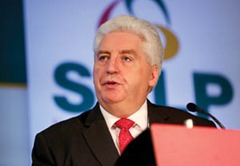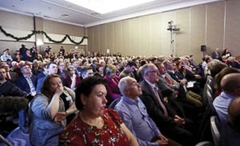SDLP prepares for poll test
 SDLP members are gearing up for a tough election campaign and are keen to tap into the public’s dissatisfaction with the DUP and Sinn Féin. Peter Cheney sums up their conference.
SDLP members are gearing up for a tough election campaign and are keen to tap into the public’s dissatisfaction with the DUP and Sinn Féin. Peter Cheney sums up their conference.
The SDLP’s main priorities at this year’s party conference were public services and reconciliation but members were also considering its electoral fortunes after a setback in the local elections. The conference took place at the Ramada Hotel on 14-15 November.
In his leader’s address, Alasdair McDonnell noted that expectations for the talks were “very low” and described the Sinn Féin and DUP approaches as delivering “a self-serving partisan gridlock.”
The SDLP would stay in the talks “as long as agreement is possible, exploring every opportunity for a positive outcome.” The party would also make the case for an official opposition – to be established “in future years” – but the concept had to be clearly defined.
On the economy, McDonnell claimed that there was a regional imbalance in inward investment projects which disadvantaged the North West. As a response, the party would set up local working groups to tackle the area’s significant economic challenges.
The leader acknowledged that the SDLP “didn’t win as many seats as we had hoped” in the May elections but could take “great satisfaction” in how a new generation of representatives was renewing the party. He had hoped for 70-plus seats but the final tally was 66.
“Today I am asking a group of these new young leaders to step forward and help draw up a strategy for growing our vote across the constituencies,” he stated. “Everyone has their own story but the principles and values are the same. We are all here because we share a common ambition for our country built on reconciliation, social justice, a shared prosperity, a united people on the island of Ireland which accommodates all cultures, traditions, religions and beliefs.”
Unlike the other main parties, the SDLP did not support electoral pacts and would be standing candidates in all 18 constituencies. McDonnell recognised that the election would be a tough one, adding that he was “already fighting South Belfast with all of my energy”.
As for Stormont, he appreciated that the majority of people were switched off by politics and promised that the SDLP would stand for real change at the next election. He personally suggested a freeze on university and college fees
over the lifetime of the next Assembly, guaranteed access to cancer drugs and pre-school education, and more jobs for young unemployed teachers. His overall aim was to “restore people’s faith in politics and get government working again.”
Deputy leader Dolores Kelly’s speech majored on reconciliation. “We recognise that if we want to bring about unity on the island we must foster unity in Northern Ireland too,” she stated. “Reconciliation is a prerequisite for major change and for future prosperity.”
The party would support legislation to overcome segregation in social housing. In a challenge to the Catholic maintained sector, Kelly said that “educating children apart” would perpetuate division and the party would “promote, incentivise and develop integrated education so that it becomes the most attractive choice for parents and children.” The rationalisation of the schools estate opened up a “huge opportunity” for integrated education.
Kelly also added more detail on the party’s call for a ‘prosperity process’ i.e. a long-term financial framework agreed with London which will allow Northern Ireland to develop its own tax and welfare systems. “Such a financial compact should be for 30-plus years and would continue even in the event of the constitutional status of Northern Ireland changing,” she explained.
 Kelly has previously called for the party to move into opposition. She clarified her position by saying that this was “simply a tactical question and because it’s tactics we can relax about having different views on it.” Such a move would not translate into a return to “unionist majority rule,” as claimed by Sinn Féin. She suggested that it would be better for the party to set out its stall in opposition before the next Assembly election.
Kelly has previously called for the party to move into opposition. She clarified her position by saying that this was “simply a tactical question and because it’s tactics we can relax about having different views on it.” Such a move would not translate into a return to “unionist majority rule,” as claimed by Sinn Féin. She suggested that it would be better for the party to set out its stall in opposition before the next Assembly election.
Public services were prominent themes throughout the conference with the party keen to highlight its campaigns against cuts. Health spokesman Fearghal McKinney called for the recruitment of extra A&E consultants and proposed longer opening hours for GP surgeries. Funding for North/South co-operation in health was due to cease next March but McKinney wanted this to become a permanent fixture to improve services to people in border areas.
Colum Eastwood highlighted how the party’s amendments had ensured that all sectors will be represented on the Education Authority and reiterated that it would “vigorously work towards for integration in all facets of society, including education.”
As with the other party conferences, the past was never far away. A fringe meeting addressed by Maíria Cahill was the best attended at the conference. Justice spokesman Alban Maginness agreed with former Victims Commissioner Kathryn Stone that OFMDFM’s Victims and Survivors Service was ineffective. He called on the department to act on her review’s recommendations.
“Victims of the Troubles must be given all the support they need,” Maginness said. “They are living with their injuries and memories every day. They must not be forgotten and they must not have to deal with a support organisation that is not fit for purpose.”
Many members would have hoped for more political success three years into McDonnell’s leadership. There have been rumblings of discontent about the local elections and its lowest European election vote share to date: 13 per cent. However, there is no sign of a leadership challenge and delegates were grateful for that stability.
They recognised that the general election would be a major test for the party, especially with its relatively low majorities in South Belfast and Foyle. McDonnell will certainly be hoping for a steady course between now and the party’s 2015 conference.





